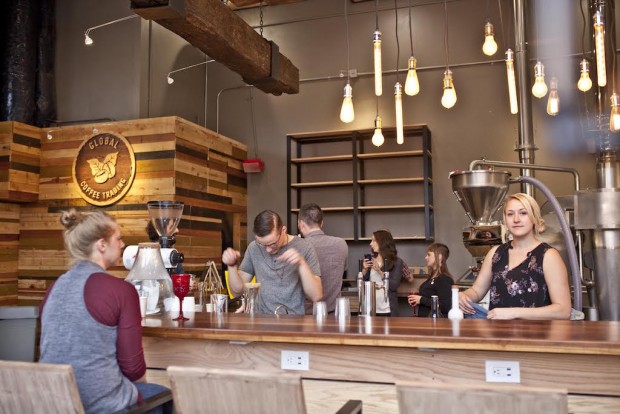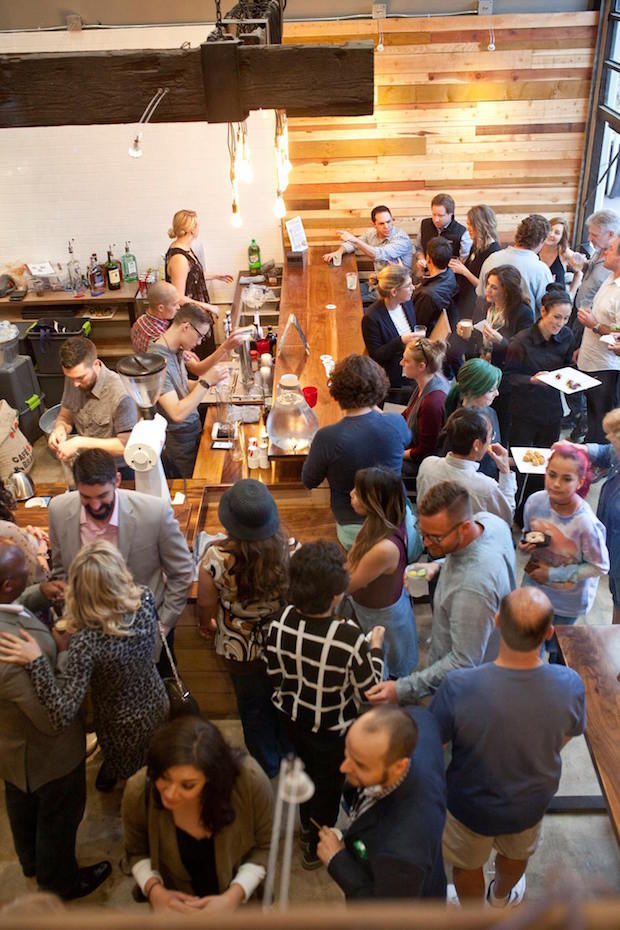
All photos taken at the Global Coffee Trading grand opening party. Courtesy of Global Coffee Trading.
Global Coffee Trading, a new coffee importing and consulting business, is putting the finishing touches on its San Diego headquarters, which, when fully furnished, will include a green coffee trading floor, quality control and training labs, a roastery, a cold brewery, and a consumer-facing retail bar.
With founding members and initial staffers bringing various areas of professional coffee expertise to the table, from importing, trading and farm-level operations to barista competitions, roasting and quality control, the company hopes to claim its place not merely as an importer, but as a business offering a full range of services for coffee buyers, roasters and retailers.
“We’ve got a great team here that has a wide range of experience,” Dave Bacon, one of three founding partners along with Mark Schellhase and Edward Kariithi, told Daily Coffee News just prior to a grand opening party last month. “We want to be a resource to our customers in any aspect of the coffee business.”
Bacon founded Global Coffee Trading after working as a trader for ICT (Intercontinental Coffee Trading), also based in San Diego, for the past six years, while Kariithi has deep roots in the Kenyan coffee sector, from which he has been actively been importing coffees grown by family members.
Bacon said the company is eager to work with buyers of virtually any size, especially smaller buyers who may be interested in some of the company’s other services. A 15-kilo Loring Roaster, sample roasters and QC/cupping labs will be available for time-share rent, and the company plans to offer services and consulting in roasting, quality control, blending, cold brewing, barista training, or any combination of those things.
“There are so many roasters that are small and growing and can’t invest in a new roaster, so we’re going to offer a bunch of different services that are more along the lines of production,” said Bacon. “They can use the QC labs, learn how to set up cuppings, or take a whole QC approach. The idea as an importer is, we want to be a resource to our customers — even those who maybe are just curious about getting into roasting.”
For the retail component, Global Coffee Trading has partnered with brewing equipment manufacturer Slayer for two custom espresso machines, which will be joined by multiple pourover methods and kegged cold brew on tap. While the facility is located in a largely light industrial area between La Jolla and Del Mar, nearby workers have expressed to GCT their enthusiasm for a public coffee bar, while businesses such as New English Brewing Company — which sits kitty corner — should help to bring in some more traffic. Said Bacon, “It’s been pretty obvious that there’s a demand.”
The company officially launched with seven employees, although Bacon said he could easily see that number doubling by the end of the year, depending on which aspects see the most growth. But at its core, and as its name implies, Global Coffee Trading is first and foremost an import trading company.
“The fact that we’ve got solid supply chain relationships maybe isn’t as important to some of our customers, but it’s a huge factor for us,” Bacon said, adding that the company strives to work diligently with producer partners on quality control issues, while offering services like flexible credit terms to help maintain long-term relationships that benefit all parties, including those buying green coffees stateside. “Coffee and the way we do business is really about personal relationships.”
Nick Brown
Nick Brown is the editor of Daily Coffee News by Roast Magazine.
Comment
1 Comment
Comments are closed.









Maybe I’m just totally off my rocker here….but…..shouldn’t someone wanting to go into the coffee business, know how to cup [extensively] already?
It also feels like cheating in a way. You gotta pay your time to earn your way in this world. Going straight to a “university” while skipping “elementary school” is laughable.
“There are so many roasters that are small and growing and can’t invest in a new roaster, so we’re going to offer a bunch of different services that are more along the lines of production,” said Bacon. “They can use the QC labs, learn how to set up cuppings, or take a whole QC approach.”